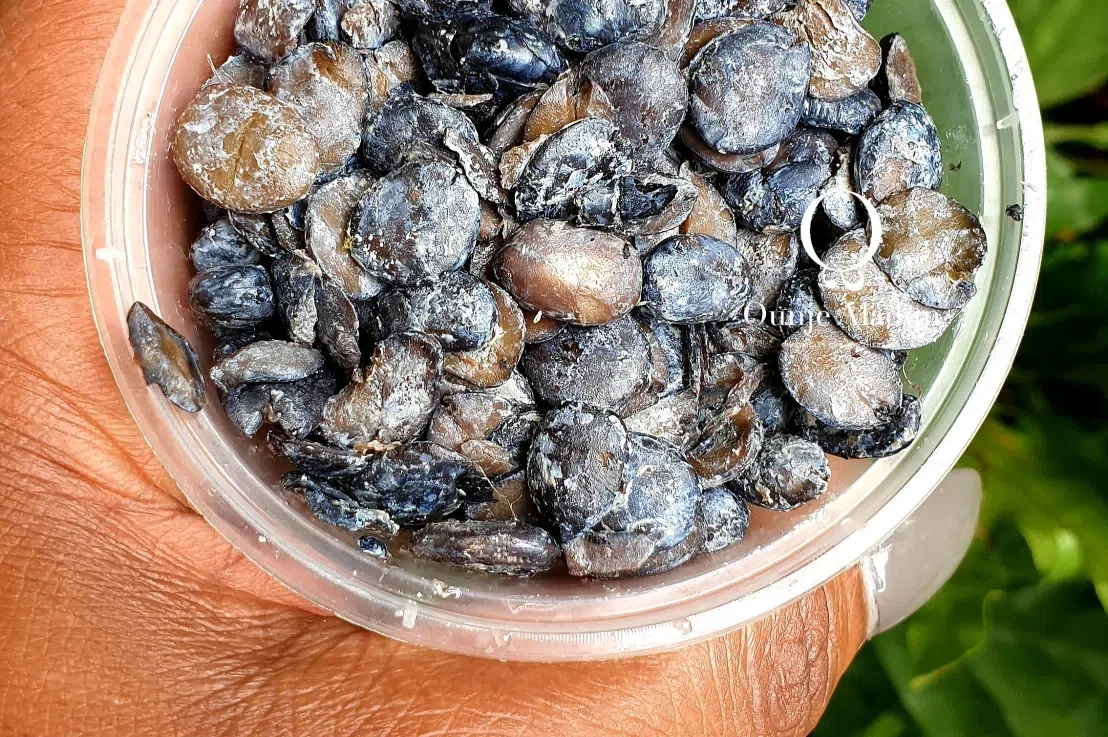The History and Origin of Iru
Iru, also known as the African locust bean, is one of the oldest and most nutritious superfoods in West Africa. It comes from the seeds of the African locust bean tree, which belongs to the leguminous plant family. This tree is native to the savannahs and forests of West and Central Africa.
Scientifically namedParkia biglobosa, this tree is commonly referred to as “Iru” in the Yoruba language. Across the continent, it has different names depending on the region, such as “dawadawa” in Hausa, “ogiri okpei” in Igbo, “sumbala” in Mali, and “eware” in Edo. Despite these variations, its purpose remains the same: to add a deep umami flavor and nutritional value to food.
How Iru Is Made: The Fermentation Process
The production of iru involves a meticulous process that can take up to two weeks. This traditional method is often described as a form of biotechnology that enhances both the flavor and the nutritional profile of the beans.
The African locust bean tree produces long brown pods filled with a sweet, yellow pulp and hard seeds—these are the locust beans. Women farmers play a crucial role in harvesting and preserving these seeds, ensuring that the process continues through generations.
The Unique Aroma of Iru
One of the most distinctive features of iru is its strong, pungent odor, which can sometimes resemble ammonia. This smell is a natural byproduct of fermentation, during which the proteins in the beans break down into amino acids and ammonia-like compounds. This process is similar to what happens in aged cheese or Japanese miso.
While the raw aroma might be intense, once iru is cooked in soups or stews, the sharpness transforms into a savory fragrance that elevates the entire dish.
The Umami Power of Iru
Umami is the fifth basic taste, often described as a deep, meaty savoriness. Foods like mushrooms, cheese, and soy sauce are known for their umami flavor. Fermented locust beans deliver the same rich depth, making them an essential seasoning in many Nigerian dishes.
Iru is commonly used in soups such as egusi, ogbono, ewedu, okro, gbegiri, and ofada sauce. Some people even add it to rice, stews, or beans to enhance the earthy flavor.
Health Benefits of Locust Beans (Iru)
Beyond its culinary uses, iru is a nutritional powerhouse with numerous health benefits. Here are some of the key advantages:
- Rich in Antioxidants: Iru contains polyphenols, flavonoids, and phenolic compounds that protect the body from free radicals, reducing the risk of chronic diseases like diabetes and heart disease.
- Supports Heart Health: Regular consumption may help lower bad cholesterol (LDL) and increase good cholesterol (HDL), promoting cardiovascular health.
- Helps Manage Hypertension: Compounds found in locust bean leaves, such as procyanidin, may help reduce high blood pressure.
- Boosts Eye Health: Rich in vitamin A, iru supports vision and may prevent conditions like cataracts and night blindness.
- Aids Digestion: As a fermented food, iru acts as a natural probiotic, supporting healthy gut bacteria and improving digestion.
- Fights Infections: The fermented seeds have antimicrobial properties that may aid oral health and gum protection.
- Prevents Anemia: Iru is a good source of iron and protein, essential for red blood cell production.
- Beneficial During Pregnancy: It provides calcium, iron, and protein, which support fetal growth and reduce the risk of complications.
- May Help Manage Diabetes: Research suggests that extracts from the locust bean seed can improve blood sugar control and reduce diabetic complications.
Cooking with Iru
There are two main types of iru available in Nigerian markets. To use it, rinse and soak the beans briefly in warm water to soften them before adding them to your dish near the start of cooking. This helps to mellow out the pungency while enhancing the flavor.
Iru is commonly used in soups, stews, and other traditional dishes. Its ability to add depth and complexity makes it a staple in many households.
Tips for Using Iru in Your Cooking
- Soak Before Use: Soaking the beans in warm water helps to soften them and reduce their strong aroma.
- Add Early in Cooking: Adding iru early in the cooking process allows its flavors to fully develop.
- Pair with Strong Flavors: Iru pairs well with bold ingredients like tomatoes, peppers, and onions.
- Experiment with Recipes: Try using it in different dishes, such as rice, stews, or even as a seasoning for grilled meats.
Whether you’re a seasoned cook or just starting out, incorporating iru into your meals can add a unique and nutritious dimension to your cuisine.
